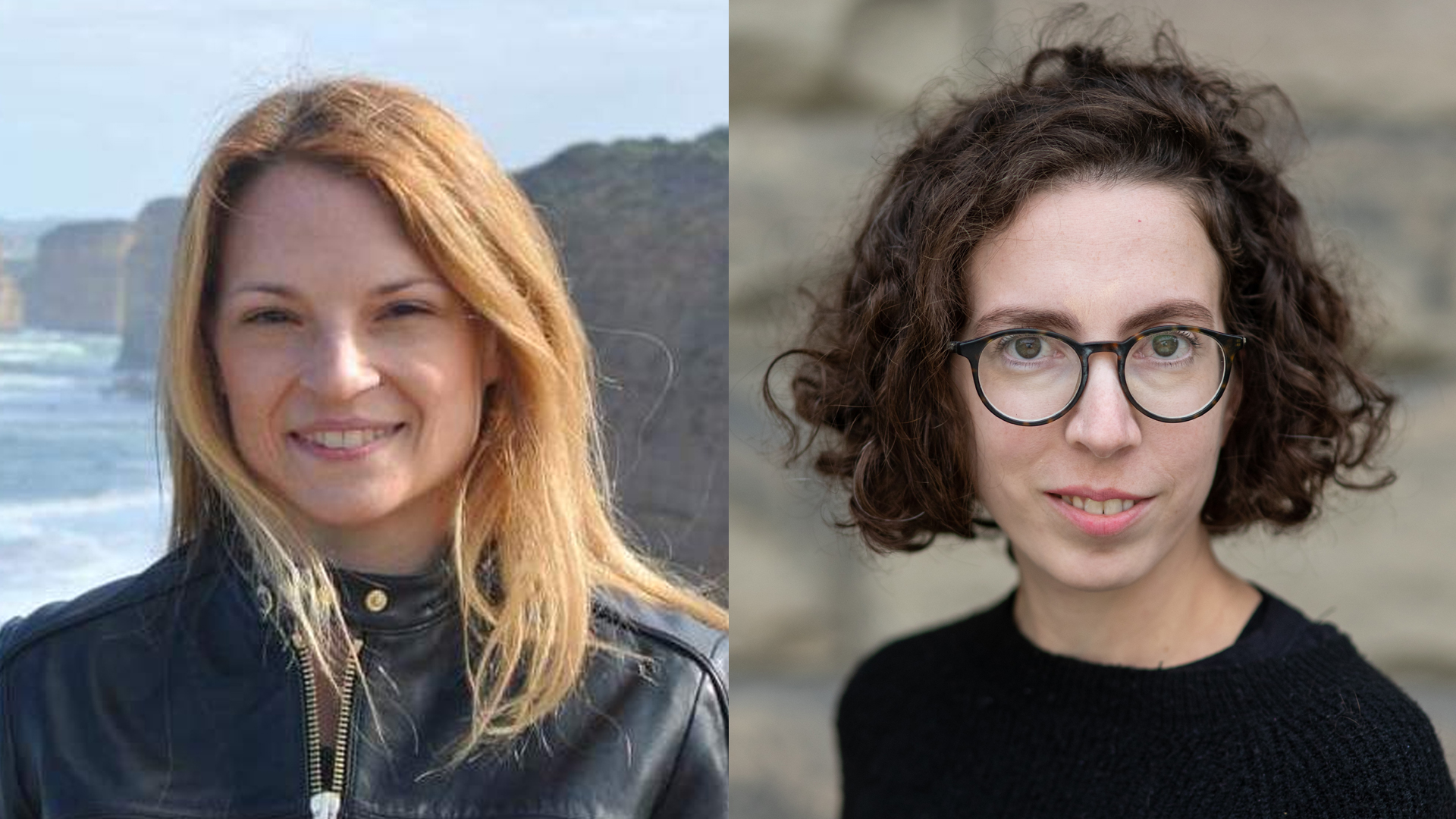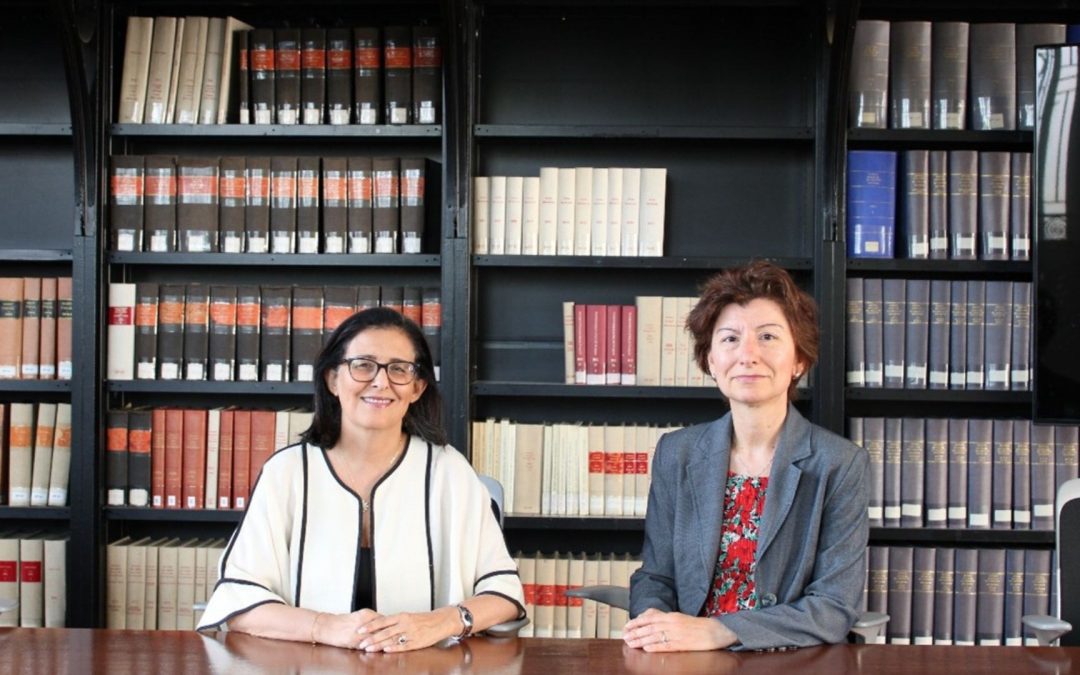Differences in placebo effects across studies can bias the results of relative effectiveness between interventions. Evidence synthesis and network meta-analysis offer a unique opportunity to study this phenomenon. Anna Chaimani, a Research Scientist at Inserm, Université Paris Cité, and Adriani Nikolakopoulou, a Post-doctoral Researcher at the Institute of Medical Biometry and Statistics (IMBI) at the University of Freiburg, Germany, are collaborating on this methodology. Learn more about their research!

© Anna Chaimani (left) and Adriani Nikolakopoulou (right)
As part of the International guest researcher programme, Dr. Anna Chaimani is hosting Dr. Adriani Nikolakopoulou in Paris for one month. They have known each other since their doctoral studies at the University of Ioannina in Greece, the latter having a well-known research laboratory specialized in evidence synthesis and meta-analysis. At Anna’s invitation, Adriani agreed with pleasure to come to Université Paris Cité. It turned out that their ideas and work are complementary. It was an excellent opportunity for them to work together on Adriani’s postdoctoral project studying the role of the placebo effect in evidence synthesis.
Gathering all the information related to a research question
Evidence synthesis is a way of combining and collecting all the data from several studies that tackle the same research question. It enables to get an overall understanding of their results, and to synthesize all the available data. The data are usually taken from randomized clinical trials and/or observational studies. Evidence synthesis helps to determine the relative effectiveness of certain interventions or medications, as well as potential subgroups of populations, for which the treatment works best.
Network meta-analysis is an evidence synthesis tool and a statistical technique for comparing three or more interventions simultaneously in a single analysis by combining direct and indirect evidence from a network of studies. Network meta-analysis produces estimates of relative effects between any pair of interventions in the network, and generally yields more precise estimates than a single direct or indirect estimate. It also allows the derivation of a hierarchy of interventions.
“We try to gather a set of studies that are homogeneous enough to be synthesized. In a network meta-analysis, we not only collect data from studies that compare the same pair of healthcare interventions, but we build what we call a network of interventions. Most of our work is methodological, which means that we develop new methodologies in the area of evidence synthesis and network meta-analysis, while the other part is applied work,” explains Anna Chaimani.
Conducting research from different angles
Anna and Adriani regurarly work with clinicians to answer clinical research questions; for instance, they have worked with psychiatrists in specifying the optimal treatment of depression, among a range of alternatives. After preparing a protocol for the whole process, their clinical collaborators collect studies and extract data, Anna and Adriani perform the statistical analyses and the entire team interprets the results. In parallel, Anna and Adriani develop new methods, which they test using simulation studies, in order to find the most suitable ways of analysing the evidence.
“What’s great about this field is that it has to be interdisciplinary. Many researchers are working on the same project, but from a different angle.” according to Adriani Nikolakopoulou. “The advantage of building methods is that they can be used for any condition and are not limited to a specific field.” adds Anna Chaimani.
“Comparative Effectiveness Research”, an International Programme in Public Health
Anna Chaimani is also a teaching faculty member. She is part of an internationally renowned team of European faculty in the Master of Public Health in Comparative Effectiveness Research programme in Paris which is taught entirely in English.
“It’s an interesting, fairly intense master’s programme that attracts international students. The first semester consists of classes only, whereas the second semester students take part in internships. Every week there are different modules. I am responsible for two modules: advanced meta-analysis and network meta-analysis. The teaching method is very interactive. Some of the students stay in the laboratory, which is good, because this master’s degree can attract new colleagues,” explains Anna Chaimani.
Anna and Adriani have discussed the possibility for students to visit Freiburg during their internships in the master’s programme.
Next steps
Over the upcoming months, Anna Chaimani and Adriani Nikolakopoulou will continue to work on their project which will enable them to deliver reliable results. They are also preparing several joint publications in peer-reviewed journals. Adriani has received an important research grant in Freiburg for the next six years for which Anna is participating. This will enable them to continue to work together and to strengthen their collaborations.
“We will study the placebo effect, which has attracted the interest of many researchers since the 1950s. The question is how to quantify how much of our response to a treatment is due to the placebo effect. In some cases, this effect can bias the estimated effect of the treatment. The goal is to understand in which situations we should be aware of the placebo effect. The ultimate goal is to correct and adjust the biased treatment effect so that it can be used for clinical decision making by healthcare professionals and the medical community,” said Adriani Nikolakopoulou.
“We would like to thank Université Paris Cité for this opportunity, without this funding, it would not have been possible for Adriani to come to Paris for a month,” says Anna Chaimani.
About
Anna Chaimani is Senior Research Scientist at Inserm, Université Paris Cité. She studied mathematics and then obtained a MSc in Biostatistics from the University of Athens in 2011 and a PhD in Epidemiology and Biostatistics from the University of Ioannina School of Medicine, Greece in 2014. Her research interests focus on methodology and software development for evidence synthesis with a greater focus on network meta-analysis. She is the leader of the evidence synthesis team of the Research Center in Epidemiology and Statistics (CRESS) and she teaches at the MSc of Comparative Effectiveness Research of Université Paris Cité. Currently, she is working on the development of new methods about ranking interventions, network meta-analysis of sparse data, and models for synthesizing heterogeneous studies.
Dr. Adriani Nikolakopoulou is a post-doctoral researcher at the Institute of Medical Biometry and Statistics (IMBI) at the University of Freiburg, Germany. She studied Applied Mathematics at the National Technical University of Athens, Greece, and Biostatistics at the University of Athens, Greece. She worked as a researcher at the University of Ioannina, Greece, and received a PhD in Biostatistics from the Institute of Social and Preventive Medicine (ISPM) at the University of Bern, Switzerland. Her research focuses on the development of methodology for evidence synthesis. She has published peer-reviewed articles in methodological, epidemiological and clinical journals and has contributed to two book chapters. With a research grant from the Swiss National Science Foundation (SNSF), she explores the role of the placebo effect in clinical investigation.
Read more

Meet Jouhaina Gherib: making the voices of universities heard in their diversity and complementarity
Holder of the UNESCO Chair “Higher Education for Sustainable Development in Africa” at the University of Manouba in Tunisia, Jouhaina Gherib is also Vice-President of the International Association of Universities at UNESCO. During her visit to Université Paris Cité, she is strengthening collaboration with the Graduate School Sustainability, Organisations and Institutions, a partner of the Chair, around the theme of social responsibility of organizations. Today, she shares insights on the main areas of the Chair, the initiatives undertaken, and the collaboration between the University of Manouba and Université Paris Cité.
read more![[Rencontre] Jouhaina Gherib : faire entendre les voix des universités dans leur diversité et leur complémentarité](https://u-pariscite.fr/wp-content/uploads/2025/09/Sans-titre-1920-x-1080-px22-1080x675.jpg)
[Rencontre] Jouhaina Gherib : faire entendre les voix des universités dans leur diversité et leur complémentarité
En visite à l’Université Paris Cité, Jouhaina Gherib, titulaire de la Chaire UNESCO « Enseignement supérieur pour le développement durable en Afrique » de l’Université de la Manouba en Tunisie renforce sa collaboration avec la Graduate School Sustainability, Organisations and Institutions, partenaire de la Chaire, autour de la responsabilité sociétale des organisations.
read more
Villages Sport 2025 : retour à l’Université Paris Cité
À l’occasion de la rentrée 2025, l'Université Paris Cité reconduit le dispositif des Villages Sport. Véritable temps fort de la vie étudiante, ce dispositif permet aux étudiantes et étudiants de découvrir la diversité de l’offre sportive proposée par l’université, de...
read more![[Semaine de la santé planétaire] Ateliers vélo et course des vélos-pupitres](https://u-pariscite.fr/wp-content/uploads/2025/09/SSP-Velos-1080x675.jpg)
[Semaine de la santé planétaire] Ateliers vélo et course des vélos-pupitres
Réparation, sécurité, remise en selle, convergence cycliste et challenge sportif : une journée entière pour valoriser le vélo comme mode de mobilité durable. Rendez-vous le 17 septembre 2025 sur plusieurs sites de l’université.
read more